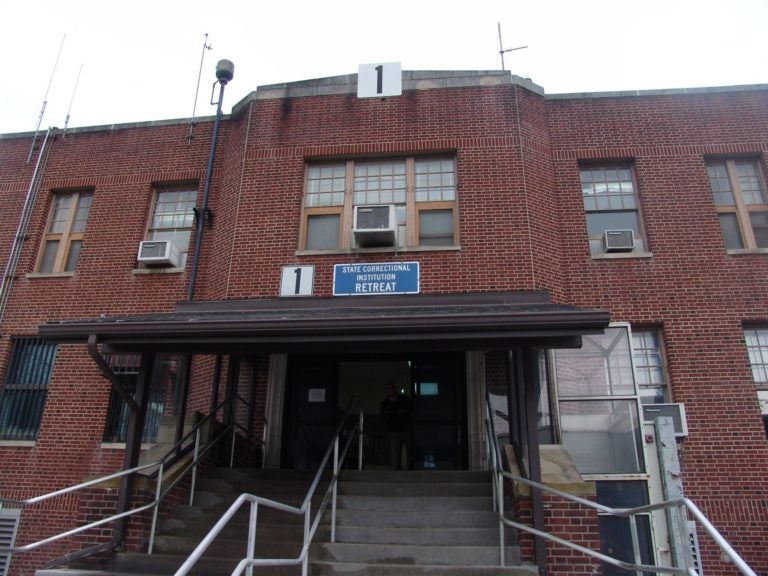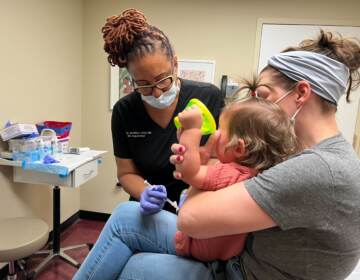Pennsylvania corrections officers, advocates worry a prison coronavirus outbreak is inevitable
As of early Friday evening, there were no reported cases of the coronavirus inside the state prison system, either among those incarcerated or corrections officers.

Beginning Saturday, officials plan to send new male inmates and parole violators to SCI Retreat in Luzerne County, while transferring most of the people currently held there to other prisons in the state. (Department of Corrections)
This article originally appeared on PA Post.
–
This story was produced as part of a joint effort among Spotlight PA, LNP Media Group, PennLive, PA Post, and WITF to cover how Pennsylvania state government is responding to the coronavirus.
Inmate advocacy groups and corrections officers alike are worried that a coronavirus outbreak inside Pennsylvania’s state prisons is an inevitability, and that should one occur, it could spread quickly because of the difficulty of practicing “social distancing.”
Officials with the state Department of Corrections said they have taken preventative measures, such as making hand sanitizer more widely available among staff, requiring employees to wear face masks, and hiring a centralized doctor as a special adviser.
As of early Friday evening, there were no reported cases of the coronavirus inside the state prison system, either among those incarcerated or corrections officers.
But the union representing about 10,000 Pennsylvania corrections officers is concerned that ongoing inmate transfers and rising tensions could mean an outbreak is on the horizon.
“One of the biggest issues is that we have asked the governor’s office to stop all non-essential transports of inmates, and we haven’t been successful in getting a response from that,” said Larry Blackwell, head of the Pennsylvania State Corrections Officers Association.
Blackwell said inmate movement is “putting all our staff and inmates at risk.”
Advocates for those incarcerated in the prisons, meanwhile, said those serving time behind bars are particularly vulnerable should the virus take hold.
“Environments of a prison are the perfect transmittal ground, and they are exactly where this virus is going to be the most pervasive and severe once it gets in,” said Claire Shubik-Richards, executive director of the Pennsylvania Prison Society, a Philadelphia-based advocacy group.
Maria Finn, a spokesperson for the Department of Corrections, said each facility has a plan to isolate infected inmates, quarantine those exposed, and to do enhanced cleaning. She also said the state is clamping on the flow of new inmates and parole violators entering the system.
Beginning Saturday, officials plan to send new male inmates and parole violators to SCI Retreat in Luzerne County, while transferring most of the people currently held there to other prisons in the state, Finn said. The department is increasing medical staff and supplies at Retreat, as well.
(The facility had been slated to close at the end of June and was at just over 60% capacity a month ago, according to the department.)
After an “intake quarantine period,” new inmates will go to SCI Camp Hill for classification and evaluation. On average, the state receives roughly 150 new male inmates each week, Finn said.
Finn said the change will “greatly [reduce] the ways the virus can enter our system.”
Rob Pezzeca, who is currently incarcerated at SCI Forest in northwest Pennsylvania, said in an interview Friday that staff at the prison are taking precautions to prevent the introduction of the virus.
He said they wear masks and have their temperatures taken before entering the facility. Inmates, too, were issued masks — although he said they were the “cheap, paper kind” — and told they can wear them when they leave their cells.
“A lot of the older guys are wearing them,” Pezzeca said.
With too few medical-grade masks to provide to all employees, Blackwell said the department is issuing guards and other staff cloth masks produced by inmates instead. Some members have raised concerns about the efficacy of the masks, although Blackwell said he did not have an opinion because it is too early to tell whether the protective equipment is effective.
Finn said the department is following all protocols from the U.S. Centers for Disease Control and Prevention and state Department of Health.
Pezzeca said he is not aware of anyone having tested positive at SCI Forest, but he said an area has been set up so that anyone displaying symptoms can be quarantined. He also said all educational and recreational time has been canceled.
Inmates are allowed outside for two 50-minute sessions in the afternoon and evening, during which they are being told to practice social distancing. He was worried the prison would be placed on lockdown because “that is when the violence starts.”
He’s also worried about the lack of access to antibacterial soap, which costs about $1.
“Some guys can’t afford the soap from the commissary,” he said
Finn said inmates are producing roughly 4,000 bars each week through Pennsylvania Correctional Industries and that soap is provided free of charge.
Inmates, many of whom may be medically vulnerable to begin with, likely do not have access to the same level of care they would on the outside, said Shubik-Richards of the Pennsylvania Prison Society.
Still, many of the measures the department has ordered — such as restricting movement within prisons — are a step in the right direction, she said, although it’s unclear to what extent all facilities are able to follow the directives.
“They’re being thoughtful and they’re doing what they can within the constraints that they have,” Shubik-Richards said. “That’s not to say they can’t do more. I think they can do more, and they need to do more, but they are definitely working in the right direction.”
She said state and county facilities should take measures to address stress among inmates and staff, de-escalate disputes, eliminate medical copays, and release people who are not a threat to public safety.
The department has suspended all visits through at least April 10. In their place, inmates have been offered 15 minutes of call time for free, as well as one 45-minute video visit per week.
Shubik-Richards said those steps help reduce stress and anxiety.
Blackwell said the union has reached out to the department to request extra incentives for officers who continue to work through the pandemic but has not heard back.
“In a way, it’s good to be an ‘essential’ employee because you definitely aren’t going to lose any pay or anything,” Blackwell said. “But as a corrections officer — a police officer, anybody — you worry about the risk of getting something and taking it back to your family.”
Spotlight PA staff writer Angela Couloumbis contributed to this story.
WHYY is your source for fact-based, in-depth journalism and information. As a nonprofit organization, we rely on financial support from readers like you. Please give today.



![CoronavirusPandemic_1024x512[1]](https://whyy.org/wp-content/uploads/2020/03/CoronavirusPandemic_1024x5121-300x150.jpg)


